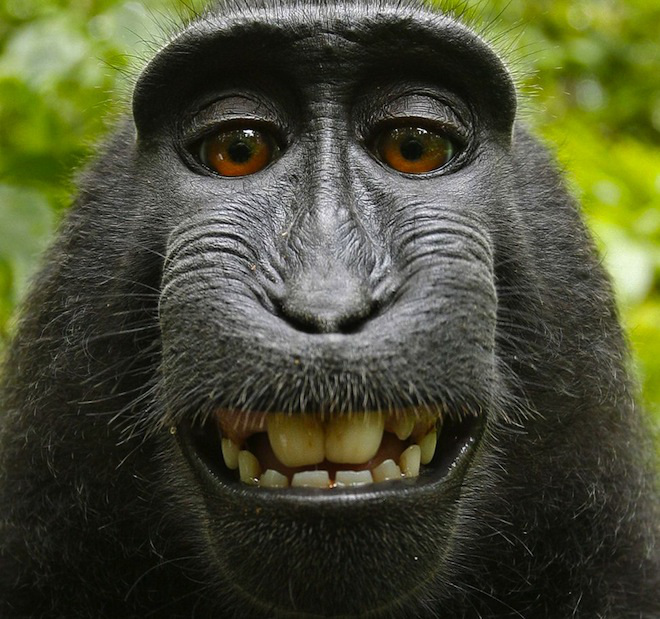New Lawsuit Claims Monkey Should Get Copyright & Royalties For Famous Selfie

The monkey seen in this image is actually the one who pressed the button on the camera. Copyright law forbids a non-human animal from holding a copyright, so many believe the image is in the public domain. PETA claims that monkeys like Naruto should be treated no differently than if a human had snapped the picture.
This is according to animal rights organization PETA, who aren’t just making a theoretical claim that a monkey deserves equal treatment under copyright law, but who have gone so far as to file a lawsuit [PDF] in federal court.
A brief refresher: In 2011, photographer David Slater was taking photos of macaque monkeys in Indonesia when one of them grabbed a camera and snapped several photos, including the one shown above.
The image became popular online and was eventually added to the Wikimedia Commons collection of 22 million images and videos that are free to use.
Slater made repeated attempts, with varying success, to have the photo pulled, claiming he was the rightful copyright holder. But in Aug. 2014, the Wikimedia Foundation explained that its understanding of U.S. copyright law is that the copyright belongs to the photographer, not the camera owner. And since the photographer in this case was a monkey, who can’t legally hold copyright, the image is in the public domain.
A U.S. Copyright Office document released weeks later bolstered this argument, citing other examples where non-humans could be said to have made art but could still not hold copyright, like a mural painted by an elephant.
But PETA claims that the monkey, who is apparently named Naruto, should be treated as if he were a human artist who had taken the same photo.
“The Monkey Selfies resulted from a series of purposeful and voluntary actions by Naruto, unaided by Slater,” reads the complaint, “resulting in original works of authorship not by Slater, but by Naruto.”
Even though the Copyright Office made its stance clear on the issue of non-humans, the lawsuit contends that the actual law isn’t as unforgiving toward monkeys and other non-human artists, arguing that the Copyright Act itself is “sufficiently broad so as to permit the protections of the law to extend to any original work, including those created by Naruto.”
PETA contends that monkeys are similar to humans in many ways and are just as interested in visual stimuli as we are.
“Naruto and all crested macaques are highly intelligent, capable of advanced reasoning and learning from experience,” reads the complaint. “Like other primates, including humans, Naruto and all crested macaques have stereoscopic color vision with depth perception and are vision dominant. As a result, visual images, including seeing their reflection in a motor bike mirror or camera lens, are intensely interesting experiences for them.”
The complaint doesn’t simply argue that Naruto should be granted copyright, but that Slater is violating the monkey photographer’s copyright by making money from the sale of a book that uses Naruto’s photo.
Even if the U.S. Copyright Office says a non-human can not register a copyright, Naruto’s legal eagles try to make the case that their client took the images in Indonesia, and thus no copyright registration in the U.S. is needed.
At the same time they allege that Slater’s continued use of the photo is a violation of Naruto’s copyright under U.S. law.
PETA is seeking to have Naruto declared the copyright holder, for the court to enjoin Slater and others from using the photos taken by Naruto, for Naruto to receive appropriate payment for the use of his photos in Slater’s book, and for unspecified damages.
While Slater has not given up his battle to be considered the copyright holder for the monkey selfit, PETA uses Slater’s own words against him in the complaint.
According to the suit, the photographer wrote in his book, “The recognition that animals have personality and should be granted rights to dignity and property would be a great thing.”
Want more consumer news? Visit our parent organization, Consumer Reports, for the latest on scams, recalls, and other consumer issues.

